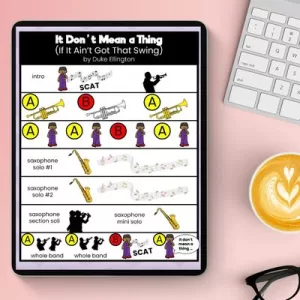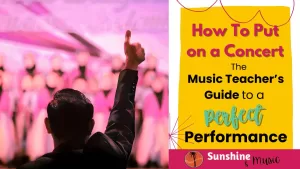There is a big wide world of music education out there. Orff, Kodaly, Gordon, ETM, Dalcroze, National Standards, Sunshine State Standards (Florida’s music standards), Marzano, CHAMPS, (suddenly I feel like I’m singing a verse from Billy Joel’s “You Can’t Stop the Fire”). Anyhow, you can see there is SO MUCH to choose from. I used to wring my hands over all the choices in methodologies. How would I know that I was teaching the RIGHT way? (Let’s be honest, from time to time I still do some soul searching). But then I decided to GO ROGUE …
Disclaimer
Please, please, please! I don’t want anyone to feel that this post is meant to slight any music teaching methods. Quite the opposite! I have friends (and readers) who fall into many different camps and want to make it clear that how you teach is AWESOME! This post is just to offer a different perspective.
In the Beginning
So here is my back story. In college and my first couple years of music teaching, my music education world revolved around Music Learning Theory (Gordon). I love MLT and it is still the backbone of everything I do. BUT. Then I moved outside my bubble, to Florida. I was the only person I knew of that was teaching MLT. In Florida, I got introduced to Orff. They could teach their kids to do AMAZING things on a xylophone. And there was such stress on musicality and creation and FUN. All things I think are critical to a good music education.
Then, in the classroom, there was a stress on teaching the standards. Standards-based learning. Well some of the standards fit with the pedagogy model I had going, but some areas were completely absent from it, and I had to find ways to keep the integrity of the standards while still keeping the integrity of MLT and Orff. And then Marzano popped in. And I needed to be previewing content and grouping kids into jigsaw activities and depths of knowledge in order to show my Marzano-ness. And my procedures through CHAMPS.
Going Rogue
Going rogue for me meant giving myself permission to not be perfectly this group or perfectly that one. I don’t quite fit in either camp and that doesn’t make me a bad music teacher. It just means I made a conscious decision between my options. Sometimes I still go to workshops or watch video of a pedagogue of Orff or Kodaly or MLT and think, man! I wish I could get to that level. But then I step back and realize, my teaching is never going to be one pure view.
Here’s an example of me navigating my methodological choices: I’m using a MLT method to expose my Kindergarteners to reading SO-MI patterns (one of the standards for kindergarten). VIDEO HERE
- My MLT peeps would say NEVER teach kindergarteners note reading. That’s way to early. They need much more exposure to singing and improvising and solfege and a long list of other things before they should be reading. (I say: we are only going to read 2 notes. I think it helps more with their understanding of high and low than REAL note reading. I kinda think of it as PRE-note reading, that will prep them for when they REALLY need to know the workings of the staff. And I’ve prepped their audiation by waiting til the end of the year when they’ve had the chance to sing and move and audiate a bit with me.)
- My Orff peeps would have been singing SO-MI patterns with them from the first weeks of school. Lots of SO-MI songs, so they are ready for reading these notes. (I say: nah. SO-MI songs are too one-dimensional for me. I only use them when we are focusing on something tricky like note-reading. When singing and playing we tend to focus more on resting tone and using a variety of tonal patterns).
Although I sometimes worry that my friends, colleagues, professors and levels instructors will feel like I have wandered from the path, I have to remind myself:
“All who wander are not lost.”
I encourage YOU to wander and find the right path for you. Understand your options and pick the one that works for you. Happy wandering!
Liked this post? More here!
Recorder Resources for your Classroom






